Experiences of Samerth Trust – a grassroot organisation in promoting Micro Entrepreneurs
Author: Ms. Gazala Paul, Managing Trustee, Samerth Charitable Trust
Imagination is the beginning of creation
Background
It is estimated that well over 260 million people, out of India’s population of over 1 billion, are living below the national poverty line. It is also projected that out of these poor households, approximately 20 per cent have access to credit through formal channels and even fewer have undertaken formal or informal financial or business training.
Women comprise half of India’s human resources and are key agents of sustainable development. The contribution of women and their role in the family as well as in the economic development and social transformation of the country is pivotal. Women are also representing an ever-increasing percentage of the total marginal or informal workers in the country. There are multiple ways in which the socialized skills of women can be turned into entrepreneurial initiatives.
It is especially true in rural and semi-urban areas with scarce industries or industries which inherently are hostile towards women due to the nature of work – like mining, where micro-enterprise rooted in the needs of the local area present as one of the most viable options to become financially independent.
Samerth Trust – an introduction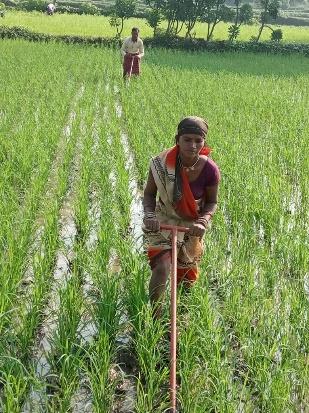
Samerth Trust initiated its operations in the drought-prone region of Rapar, Kutch (Gujarat) in early 2000 based on the poor human development index of the area. Our interventions began by providing potable water through participatory groundwater management and later as villages became self-sufficient in water, livelihood became their biggest focus in order to avoid distress migration. With no industries in the area, the only livelihood options are rooted in the local economy including agriculture and Animal Husbandry. In Rapar with a population of over 2 lakh people, even today one cannot find ATMs or banks for 100 km at a stretch. Samerth started supporting men and women from marginalized communities on their entrepreneurial aspirations and today has a broad base of more than 300 individuals who have been able to successfully start and sustain local businesses.
Samerth later expanded to Ahmedabad (Gujarat) and then Chhattisgarh working with communities who are marginalized and come from low-income backgrounds. In Chhattisgarh, the focus has been tribal communities and in the urban and semi-urban areas of the Ahmedabad district, it was migrant and vulnerable groups. We started working in Ahmedabad & Chhattisgarh on education and livelihood issues. Currently, we reach out to more than 70,000 families directly through various interventions. In both these areas, we have supported communities’ initiate enterprises – especially women through special training and support and today we reach out to more than 1000 entrepreneurs in both these regions.
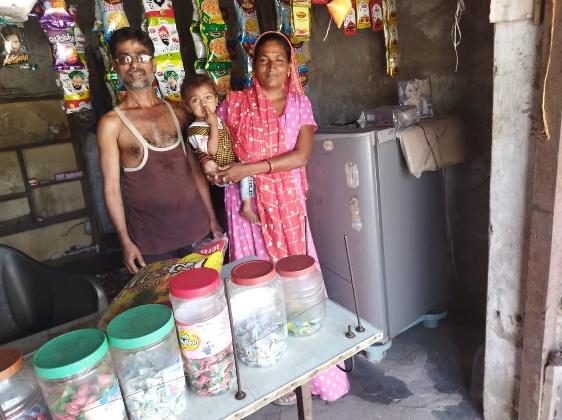 In all three regions, in Rapar due to sheer distance and lack of administrative support, in Chhattisgarh as the focus are the PVTGs – Particularly Vulnerable Tribal Groups living in hilly forest regions with poor accessibility, and in Ahmedabad marginalised communities of western Ahmedabad as well as women in Sanand face a great barrier in accessing formal sources of loan like banks, and still fall prey to private players who provide loan at exorbitant rates. Samerth works with more than 48 micro-entrepreneurs in Ahmedabad, in an urban and rural areas, supporting small shops or helping establish their street businesses on carts, women entrepreneurs to set up food businesses etc. In areas like Kutch and Chhattisgarh, Samerth has been battling against some of the most challenging living conditions- extreme climate, deforestation, and soil depletion that often gets exacerbated by unpredictable natural calamities. In Kutch, in the desert area surrounded by big and small rann where frequent droughts, water scarcity and salinity in the groundwater overpowers everything the support for setting up small enterprises creates significant impacts and becomes key to alleviating poverty. Samerth has worked with 283 families for dairy/animal husbandry, setting up small businesses, auto services, higher education, and agriculture activities in the Rapar block of Kutch. We also provide technical and training assistance for setting up vermicomposting, biogas installation of solar pumps, livestock promotion and dairy business.
In all three regions, in Rapar due to sheer distance and lack of administrative support, in Chhattisgarh as the focus are the PVTGs – Particularly Vulnerable Tribal Groups living in hilly forest regions with poor accessibility, and in Ahmedabad marginalised communities of western Ahmedabad as well as women in Sanand face a great barrier in accessing formal sources of loan like banks, and still fall prey to private players who provide loan at exorbitant rates. Samerth works with more than 48 micro-entrepreneurs in Ahmedabad, in an urban and rural areas, supporting small shops or helping establish their street businesses on carts, women entrepreneurs to set up food businesses etc. In areas like Kutch and Chhattisgarh, Samerth has been battling against some of the most challenging living conditions- extreme climate, deforestation, and soil depletion that often gets exacerbated by unpredictable natural calamities. In Kutch, in the desert area surrounded by big and small rann where frequent droughts, water scarcity and salinity in the groundwater overpowers everything the support for setting up small enterprises creates significant impacts and becomes key to alleviating poverty. Samerth has worked with 283 families for dairy/animal husbandry, setting up small businesses, auto services, higher education, and agriculture activities in the Rapar block of Kutch. We also provide technical and training assistance for setting up vermicomposting, biogas installation of solar pumps, livestock promotion and dairy business.
In Kwardha district of CG – Samerth has promoted 665 enterprises on pisciculture, poultry farming, NTFP collection and marketing as well as farm-based livelihoods by linking them with available forest and government schemes on technical training, accessing loans etc.
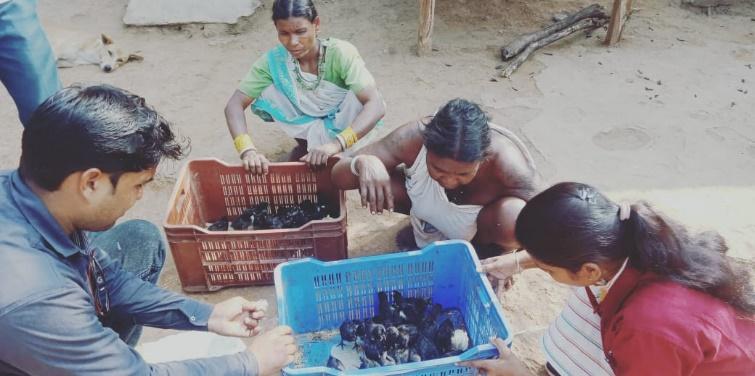
Thus, more than 1000 micro-entrepreneurs are handheld and supported on a regular basis with financial support, business strategy as well as market linkage. Samerth overall vision is to help people get out of poverty and to pursue this goal we have been encouraging social business. The idea is to create products or services that provide social benefits.
In Samerth’s experience, rural and semi-urban micro-entrepreneurs do not readily receive the training and support systems that facilitate the upgrading of skills as well as the general understanding of organising and managing successful businesses. The transition from homemaker to sophisticated entrepreneur is no small challenge, however, women across India are increasingly showing an interest in economic independence.
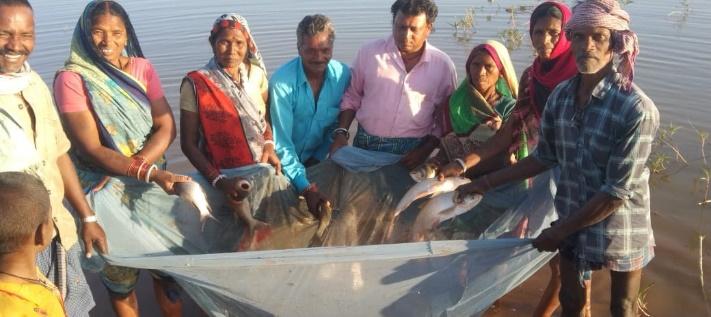
Samerth’s support the microentrepreneurs stresses encompassing the skills in a way that extends beyond financial support to those of creating market linkages.
Each cluster of activities provided a learning experience that has helped to shape the concept of social business/micro-enterprises.
Our learnings of the last decade of promoting micro-entrepreneurs
- Only providing microfinance support is not enough. Samerth’s experience of working in some of the poorest areas has highlighted that in many instances, providing finance to low-income communities does not effectively reduce poverty levels. More comprehensive services are required to enable them to benefit from financial inclusion. Constant hand-holding in the initial years and support in market linkages is the key for any micro-enterprise to not only survive but thrive. The enterprise must be prepared to compete with the market. It must provide high-quality goods and services, and provide excellent value for the prices it charges.
- Building a multi-partnership model benefits all. Partnering with multi-sector organizations to offer training and business counselling on enterprise feasibility, Samerth worked towards strengthening collectives and creating market linkages and financial linkages via banks.
- Capacitating the entrepreneur is the key. Wherever possible, formal capacity-building micro-enterprise development training is undertaken. These training are delivered in local, vernacular languages and through contextually relevant methods, with content derived from the region. This training is crucial as the world is changing faster, particularly in the realms of economic development and technology.
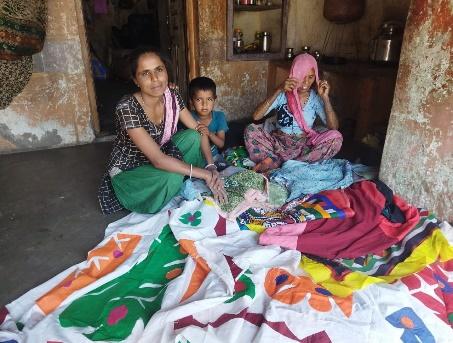 4. Women-led enterprises lead to many other changes in society. Finally, micro-enterprises headed by women are important indicators in demonstrating overall and holistic economic development, which also incorporates social elements such as the promotion of gender grievance and redressal forums, and an awareness of health and physical wellbeing as an essential aspect of both maintaining productive livelihood activities and reducing the financial burden on individuals and families alike.
4. Women-led enterprises lead to many other changes in society. Finally, micro-enterprises headed by women are important indicators in demonstrating overall and holistic economic development, which also incorporates social elements such as the promotion of gender grievance and redressal forums, and an awareness of health and physical wellbeing as an essential aspect of both maintaining productive livelihood activities and reducing the financial burden on individuals and families alike.- Role of Banks for Financial Inclusion: We must not overlook the fact, however, that strong support for credit through formal banks is crucial. The vibrant micro-enterprise will further blossom with the pro-active involvement of nationalised and private sector Banks and credit institutions. It is only with the strengthening of these institutions, that the promotion of micro-entrepreneurs can happen and spur economic growth.
Highlighting here is a case study of our women entrepreneurs from Sanand in Gujarat. This programme is supported by WIN Foundation.
Inspiring Micro Enterprise Innovation: Asha Poshak Nashto (Asha Nutritive Snacks)
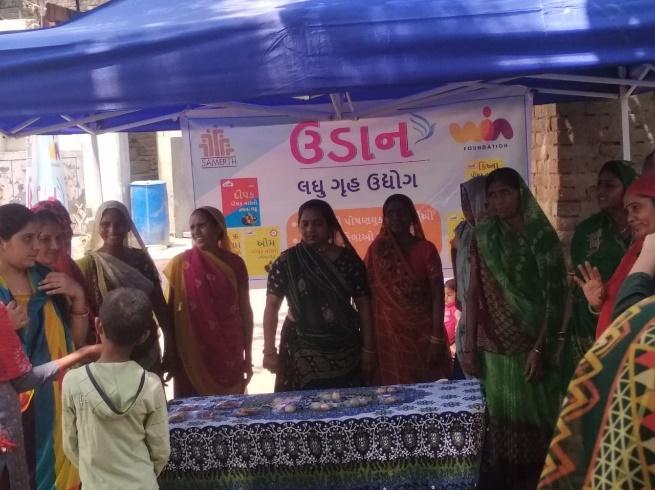
Samerth has been working in five villages of Sanand since 2019. Sanand was a small sleepy town in the Ahmedabad district, that shot to prominence after the Tata Nano factory relocated from West Bengal to Sanand. After Nano, many other ancillary companies came to Sanand and from an agricultural zone, it became an industrial zone. Overnight the land prices shot up and big farmers became rich. The poor farmers with small land holdings became factory workers. Though there were industries, the social dynamics did not change, women were still expected to cover their faces, were not allowed to carry smartphones, girls were not allowed to study and most menial jobs were delegated to women.
Samerth had been working in the government schools of the area on enhancing the quality of education and nutrition had been one of the focus areas. Our team was also working with women to form Self Help Groups, save regularly, come together on a platform etc. It was in this situation that the pandemic struck and many factory workers lost their jobs. With no income and poor skills, it became difficult for families to sustain themselves. It is in these circumstances that the WIN Foundation training on nutri entrepreneurs was initiated with our self-help groups. The model was simple – women to be trained in microenterprise development, from product development to costing to packaging to the market linkage, handheld through the process. The women were also trained in nutrition, understanding the needs of their bodies, especially during times of change (adolescent – onset of the menstrual cycle) Pregnancy, and menopause combined with the nutritive content of our day-to-day food and how to match the needs to the content. This gave them an overall perspective on the foods -especially traditional ones that they have been traditionally consuming across generations. The training also helped them gain insight into the nutritional needs of a growing child and based on this understanding their product for enterprise took shape.
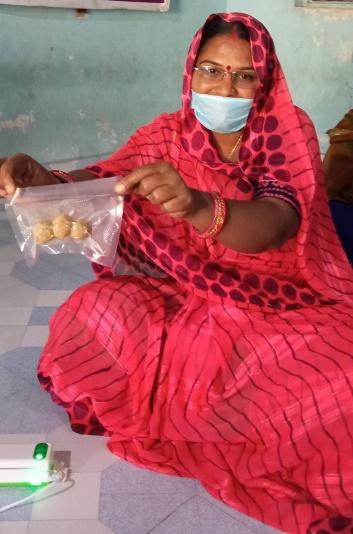
The idea was to make traditional sweet and savoury products with nutritive content which children and adults can eat instead of ready-to-eat packaged food with zero nutritional value in addition to the harm it causes to the environment with the packaging. It was a win–win for both, women getting an entrepreneurial product, which primarily caters to their own communities. Due to its proximity to the city and industrial belt, there were many other avenues for the products too. The micro-enterprise development training conducted by Mr Nikesh Ingle was a robust program of theoretical concepts that were delivered with practical exercises. It required every trainee to visit a local marketplace during the training. This provided an important initial exposure to the environments in which they will be conducting business and a valuable insight into aspects of operation such as local competition, typical footfalls, demand and market opportunities, customer buying capacities etc. Such experience also contributes to building a greater preparedness for executing effective enterprise plans. Furthermore, constant handholding gave them further encouragement to continue with their venture. This also includes bringing the technical aspect in current times – a WhatsApp business training that was held online for about 16 hours throughout the month. This training helped entrepreneurs gain confidence that their products and services can reach a larger audience without spending on marketing.
The product was of high-quality nutritious food and also served low-income groups, especially children. We are providing food to daycare centres with intellectually challenged children and young adults. The products were competitive price-wise as they didn’t require costly packaging or advertisement.
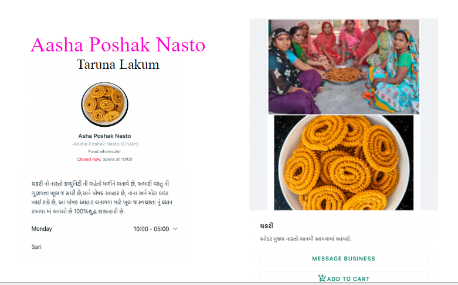
It has been early days since the women started actively producing and selling their products and they have great responses within and outside the community. There is certainly hope that with the right support, these women will only march stronger ahead.
I certainly believe that there is huge scope to support the vulnerable and marginalised with business development training along with micro-credit to encourage them to become micro-entrepreneurs in their own right. We need to think strategically and analyse the potential role of communities for growth. The whole idea is to put our minds to it and create what we want by providing a fair chance to unleased the community’s energy and creativity. I believe that combined with technology, creating local solutions with global markets is the future.
Moreover, establishing financial institutions for rural areas is the beginning. Banking penetration, access to banking services, and use of banking services significantly influence financial Stability for women entrepreneurs living in difficult areas.
If you are keen to introduce micro-entrepreneurship training in your area or village for local communities and want to know more about our work, feel free to reach out to us at info@winfoundations.org
